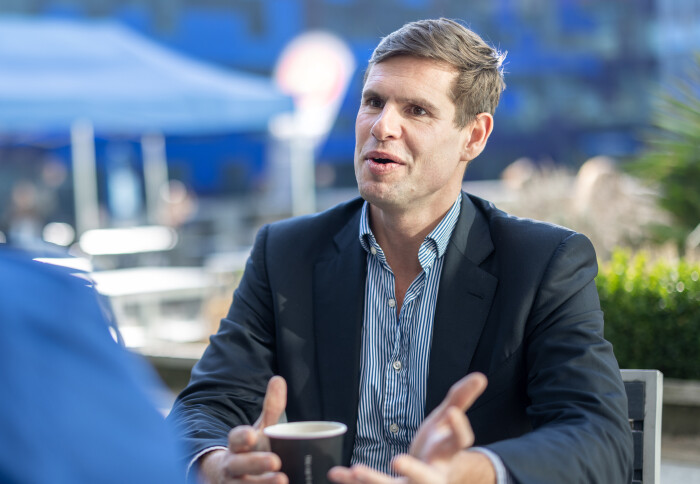Become a mentor in Imperial’s Reverse Mentoring Programme

Imperial’s Reverse Mentoring Programme is looking for colleagues to mentor university senior leaders.
Applications to become a mentor in Imperial’s Reverse Mentoring Programme are now open. Reverse Mentoring is when a senior leader is mentored by a more junior colleague. The programme gives the mentor a glimpse into how Imperial is run at a senior level, while providing the senior leader being mentored a different perspective of working life at the university, particularly in terms of diversity and inclusion.
The reverse mentoring program not only enhances active listening skills but also expands networking opportunities, facilitating collaboration among individuals who may not have interacted otherwise. Aneesha Bhumber Mentor
The programme is open to all colleagues at Imperial, and members from underrepresented groups such as minority ethnic staff, LGBTQIA+ staff, neurodiverse and disabled staff, are especially encouraged to apply.
The Reverse Mentoring Programme was the result of the Inclusive Leadership Action Plan that came out of the 2019 Staff Survey. Part of the plan was to trial a Reverse Mentoring scheme for the university’s Board members. The scheme proved to be a success ,so it was decided to widen it out to include all senior management.
A Mentor’s Perspective
Previous mentors have found the programme very rewarding in helping to build confidence, in particular with interactions with senior leaders, as well as a chance to network, and gain an insight into the challenges of running a large institution like Imperial.
Aneesha Bhumber is a teaching laboratories technician in the Faculty of Medicine Centre and has been a reverse mentor to two senior leaders. Aneesha mentored Professor Edwin Chilvers and Robert Kerse.

“I participated twice in the Reverse Mentoring Programme as I found it to be a unique initiative; it offered junior staff the chance to mentor. This exemplified Imperial's dedication to fostering collaboration and sharing insights across different levels, departments, and roles.
“Through these sessions, I gained insight into senior-level operations, exchanged valuable advice, and problem-solved collaboratively.
“Both as a mentor and a mentee, these experiences deepened our understanding of our respective roles, and fostered mutual appreciation for each other's work. Moreover, it enabled us to identify ways to support one another in the future, and share diverse perspectives and journeys.
“The reverse mentoring program not only enhances active listening skills but also expands networking opportunities, facilitating collaboration among individuals who may not have interacted otherwise.”
The Senior Leader’s Perspective
Our reverse mentoring programme is invaluable for leaders and managers to gain a greater understanding of the lived experience of members of our community. Robert Kerse Chief Operating Officer
Senior leaders who’ve participated in Reverse Mentoring have found the experience extremely useful as it has allowed them to view our university's challenges and opportunities through a different lens, and enhanced their understanding of, and commitment to, inclusivity.
Professor Edwin Chilvers is Emeritus Professor of Medicine and was mentored by Aneesha Bhumber when he was head of the National Heart and Lung Institute at Imperial.

“During my time as Head of Department at the NHLI I had the immense pleasure of having Aneesha as my ‘reverse’ mentor. In truth, it was the most enjoyable meeting in my diary and hugely impactful. Nothing was off limits, and I found her help and guidance super-helpful.
"Our conversations were always positive and encouraging and allowed a safe space for us to discuss all things Imperial”.
Aneesha also mentored Robert Kerse, Imperial’s Chief Operating Officer. (Pictured at the top of this story).
Robert said: “Our reverse mentoring programme is invaluable for leaders and managers to gain a greater understanding of the lived experience of members of our community. An appreciation of what it’s like to be a part of Imperial if you are from a diverse background is essential to achieving the community inclusion goals contained within our new institutional Strategy. The programme is also a great opportunity to make new personal connections.”
How do I apply to be a reverse mentor?
If you are interested in becoming a reverse mentor, please submit your expression of interest via the Reverse Mentoring Programme webpage. Once accepted onto the scheme, you will be invited to attend an online Reverse Mentoring training session, taking place on Wednesday the 1 May, between 09.30-12.30, and you must attend this before you can be matched with a mentee.
For any questions, please contact either Kani Kamara, Head of the Equality, Diversity and Inclusion Centre (EDIC) or Jane Sloan, Learning and Development Adviser.
Article text (excluding photos or graphics) © Imperial College London.
Photos and graphics subject to third party copyright used with permission or © Imperial College London.
Reporter
Laurie Anderson
Communications Division